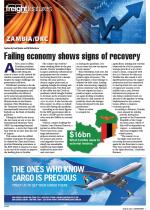The Democratic Republic of the Congo (DRC), along with Burundi and neighbouring countries within the Great Lakes region of East Africa, are set to benefit from a new trade and facilitation project.Facilitated by the World Bank’s International Development Association (Ida), which helps the world’s poorest countries by providing grants and low- to zero-interest loans for projects and programmes that boost economic growth, the project is set to increase cross-border trade.Some $250 million of financing has been approved to facilitate cross-border trade and enhance the commercialisation of selected value chains, primarily targeting small-scale and women traders in the borderlands of the Great Lakes region.“Local cross-border trade, if properly facilitated, can be an important way to address poverty, food insecurity, conflict, and other socioeconomic vulnerabilities that populations in the border areas face,” said Dr Chris Onyango, director of customs and trade of the Common Market for Eastern and Southern Africa (Comesa). “We seek to reduce the cost and time to trade and improve the volume and quality of goods that are traded to boost incomes, prosperity, and stability in Burundi, the DRC, and the wider region.”The project incorporates interventions combining policy and procedure reforms to address a mix of constraints related to poor infrastructure, insecurity, cumbersome trade requirements, poor handling of products post-production, and limited trust between traders and border agencies, among other factors.Onyango said despite the project focusing only on two countries, the interventions were a practical implementation of the measures necessary to achieve the ideals and objectives of trade integration across Africa, both at continental and regional levels.“The African Continental Free Trade Agreement (AfCFTA) provides a solid policy platform for African countries to accelerate economic transformation, but it is at the regional level that many concrete actions are needed to address major constraints to trade integration,” said Boutheina Guermazi, World Bank director for regional integration for sub-Saharan Africa, the Middle East and Northern Africa. “This project brings specificity to local and regional constraints, and provides solutions.”

